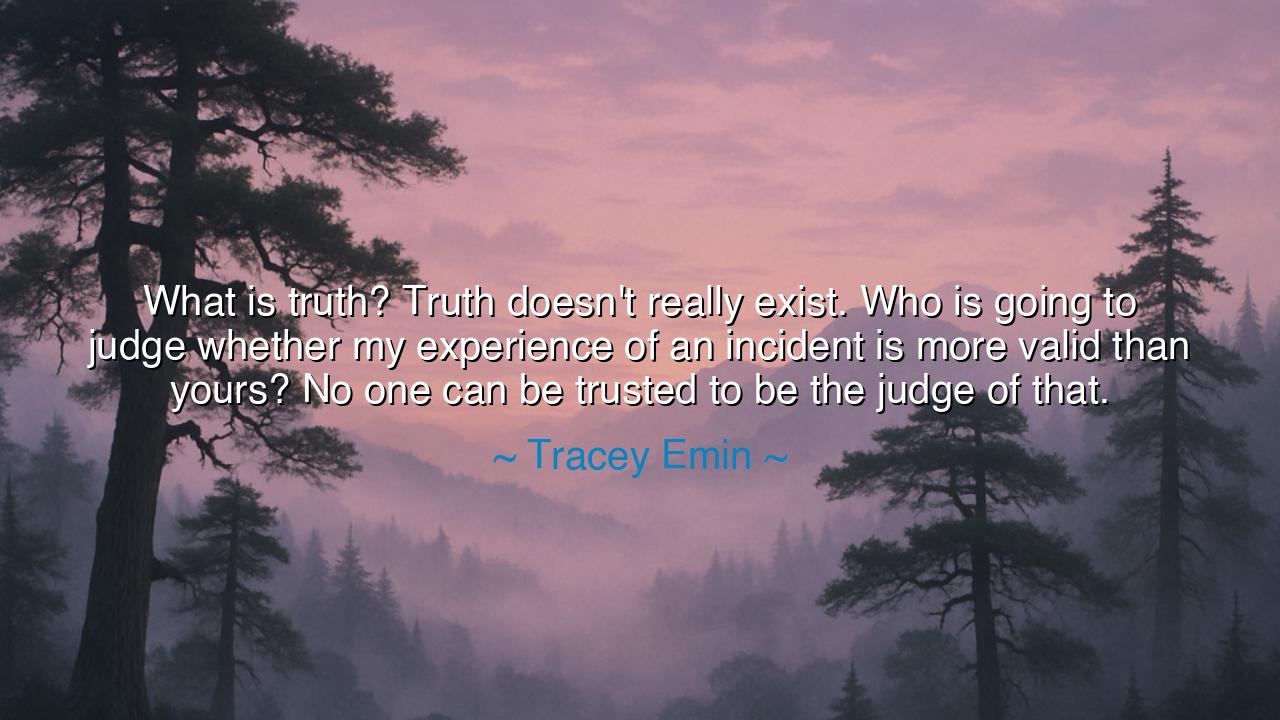
What is truth? Truth doesn't really exist. Who is going to judge
What is truth? Truth doesn't really exist. Who is going to judge whether my experience of an incident is more valid than yours? No one can be trusted to be the judge of that.






Opening Scene – Narrated by Host
The room was quiet except for the soft hum of the city outside. Jack sat by the window, gazing out at the evening sky. His thoughts seemed distant, tangled in a web of questions that had no easy answers. The setting sun bathed the room in a warm, golden light, but Jack barely noticed. His mind was consumed by an idea—a challenging thought that he couldn’t shake.
Jeeny entered the room, noticing Jack’s faraway expression. She set down a cup of tea on the table beside him, her gaze soft as she sat down across from him.
Jeeny: “You look like you’re wrestling with something. What’s on your mind?”
Jack turned slowly, blinking as though coming out of a daze. He gave a small, reflective smile before answering.
Jack: “I was thinking about something Tracey Emin said recently. She said, ‘What is truth? Truth doesn’t really exist. Who is going to judge whether my experience of an incident is more valid than yours? No one can be trusted to be the judge of that.’ It really struck me. I’ve always thought of truth as something concrete, something we could rely on. But what if it’s not that simple? What if truth is just as subjective as our experiences?”
Jeeny sat back, her expression thoughtful as she processed his words. She slowly took a sip of her tea, considering the depth of the question.
Jeeny: “It’s an interesting thought, isn’t it? The idea that truth isn’t something universal, but something personal, shaped by our own experiences. We’re often taught that there’s one truth, one reality. But maybe that’s not how it works. Maybe our own perceptions, the way we experience the world, are what create our truths. And who’s to say whose truth is more valid?”
Jack: “Exactly. And I think the tricky part is that we’re always trying to impose our own version of truth on others. We believe our perspective is the correct one, the objective one. But the more I think about it, the more I realize that truth isn’t fixed—it’s fluid, it changes depending on who’s telling the story, and from what angle.”
Host: The conversation seemed to deepen as Jack’s thoughts unraveled. The idea that truth wasn’t some immutable, universal constant was difficult to accept, but in the silence of the room, it began to make sense. If truth was shaped by experience, how could anyone’s truth be more valid than another’s? And who was the judge of that?
Jeeny: “It’s kind of liberating, though, isn’t it? To think that truth isn’t something absolute. That there’s room for different perspectives, different experiences. It’s not about finding the ‘right’ truth—it’s about recognizing that each person’s truth is valid because it’s based on their own experiences, their own understanding of the world.”
Jack: “But then, where does that leave us? If no one can judge what’s true, how do we make sense of anything? How do we navigate through the world if truth is so subjective?”
Jeeny: “Maybe it’s not about finding the absolute truth. Maybe it’s about being open to others’ truths, understanding that people see the world differently based on their backgrounds, their experiences, and their emotions. It’s about empathy, about trying to see things through another person’s eyes.”
Host: Jack let out a slow breath, the weight of the conversation settling in. He realized that the idea of truth being subjective didn’t mean there was no such thing as reality—it just meant that the reality each person experienced was shaped by a combination of their emotions, history, and perspective. And while that could make things complicated, it also made human interaction richer, more nuanced.
Jack: “I think I get it now. It’s not about saying that there’s no truth at all—it’s about recognizing that truth is experienced differently by everyone. Our reality is shaped by who we are, what we’ve gone through, and how we interpret things. It’s not something we can judge, because no one has the full picture.”
Jeeny: “Exactly. And I think the hardest part is accepting that our truth is just that—our truth. It’s not about being right or wrong, it’s about understanding that everyone has their own version of the world. And in that, there’s so much room for compassion, for connection.”
Climax and Reconciliation
Jack sat back, the weight of their conversation sinking in. He realized that truth wasn’t about finding one definitive answer—it was about understanding that every person’s experience was valid, and that those experiences shaped the truths they held. The world was full of different realities, and the key to navigating it was empathy, understanding, and respect for the perspectives of others.
Jack: “I think I’ve finally grasped it. Truth isn’t something we can own. It’s something we share, shaped by who we are and what we’ve lived through. And when we accept that, we open ourselves up to deeper connections with others.”
Jeeny: “Exactly. It’s not about being right—it’s about understanding. The more we acknowledge that everyone has their own truth, the more compassionate and connected we can be.”
Host: The room felt warmer now, the weight of their conversation having shifted Jack’s perspective. Outside, the world continued its rhythm, but inside, they had found clarity. Truth, as they had discovered, was not a fixed point—it was a collection of experiences, perspectives, and emotions, each person’s version of reality shaped by their own life. The challenge was not to find one objective truth, but to respect and understand the truths of others, and in doing so, create a deeper connection with the world around them.






AAdministratorAdministrator
Welcome, honored guests. Please leave a comment, we will respond soon